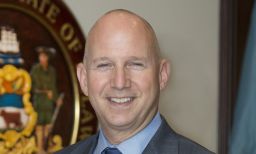Editor’s Note: Jack Markell is governor of Delaware. Randi Weingarten is president of the American Federation of Teachers. The views expressed are their own.
Story highlights
North Carolina is suing the U.S. Justice Department over its so-called bathroom bill
Transgender people are people first, worthy of dignity and respect, writers say
The story of America, at its best, is one of an ever-widening circle of inclusion, with each generation showing a greater openness to communities once excluded. But recent efforts to marginalize certain people and groups, specifically transgender and gender-nonconforming people, are an affront to America’s inclusiveness.
On Monday, the state of North Carolina sued the federal government over the Justice Department’s ruling that a state law blocking legal protections for lesbian, gay, bisexual and transgender people, particularly bathroom access for transgender individuals, violates civil rights law.
We both feel compelled to speak out against such intolerance; to call for steps to protect the rights of all people, regardless of their race, religion, or gender identity or expression; and to help everyone feel safe and welcome as they go about their lives, particularly in our public schools.


Our experiences have shown us ways to do this – as a governor who proudly signed into law a bill with protections for transgender people in employment, housing and public accommodations, and as a teacher and union leader advocating for equal protection and safe and welcoming environments for everyone who attends or works in our public schools.
Increasingly, Americans are learning more about transgender people and the issues they face. Unfortunately – and perhaps as a reaction to growing support for LGBT individuals – states like North Carolina and Mississippi have chosen to single out their LGBT residents for exclusion and intolerance. And a school board in Florida recently passed what has been called a “gender inspection” policy that prohibits transgender students from using the bathroom that corresponds to their gender identity.
No harm
While opponents of transgender equality stoke fears around bathrooms, the reality is that allowing transgender people access to restrooms – without fear of discrimination or harassment – doesn’t hurt anyone. An investigation of 12 states and 17 school districts with protections for LGBT people found no increase in incidences of harassment or inappropriate behavior after those protections were enacted.
As the governor of a state where transgender people can fully participate in society, including by using facilities in accordance with their gender identities, the only consequences have been that transgender people know Delaware is a safe and welcoming place, and businesses know we foster talent and skills among all our residents. That should be the case for every person, in every state.
Many of the restrictions on the rights of transgender people are played out in our public schools. While most schools have policies against bullying and harassment, most of these policies don’t specifically include protections based on gender identity or expression. Transgender students report high levels of harassment, bullying and assault.
So-called bathroom bills will make an already vulnerable group even less secure, which has been shown to lead to students missing classes, underperforming academically and dropping out of school. About 40 percent of homeless youth are LGBT.
Most important, discrimination against transgender people can be a matter of life or death. More than half of transgender and gender-nonconforming people who were bullied, harassed or assaulted in school because of their gender identity have attempted suicide, according to a recent survey. Respondents reported attempting suicide at a rate more than 25 times the national average.
Enacting anti-discrimination laws
As a gay woman, the fight to change laws and attitudes is also quite personal. It has given me great hope about America as centuries of discrimination against gay people have given way in the last few years to widespread legal and societal acceptance and rights.
But as Martin Luther King Jr. cautioned, injustice anywhere is a threat to justice everywhere. We cannot legislate tolerance and acceptance. But we can pass laws and policies that prohibit discrimination, and, as history has shown, attitudes will begin to shift.
We all have a role to play when a segment of society is being treated unfairly. There is a growing understanding that existing sex discrimination laws protect LGBT people from bigotry, which is why the Department of Justice informed North Carolina that it was in violation of federal law. But governors, mayors and other elected leaders can lead the way in enacting anti-discrimination laws like Delaware’s that explicitly protect LGBT people.
And we call on school districts to ensure that anti-bullying and anti-harassment policies include transgender and gender-nonconforming people, and that the rights of transgender students are upheld with the same fidelity as any other students’. Our schools must be safe places for learning, and part of that is understanding differences and celebrating diversity.
Transgender people are our neighbors, friends, co-workers and children. More than anything else, they are people first, worthy of dignity and respect. It is time our communities and our country take another step forward and affirm that “We the People” means all of us, without exception.
Join us on Facebook.com/CNNOpinion.
Read CNNOpinion’s Flipboard magazine.


